Creating artwork can enable someone to express key parts of themselves, their personality, their past, or their values. So often when you are looking at artwork, you are seeing parts of the artist.
Experience 068 Teresa James on:


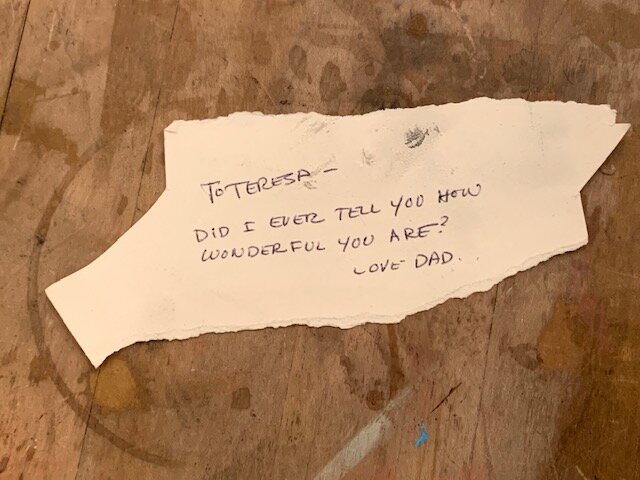
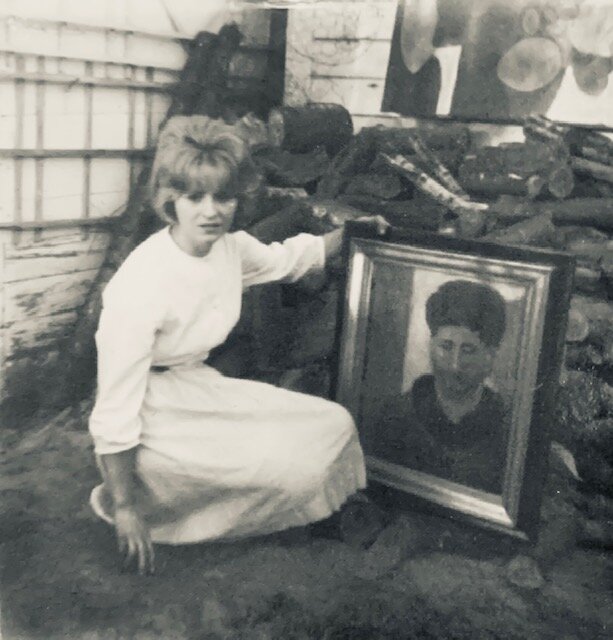
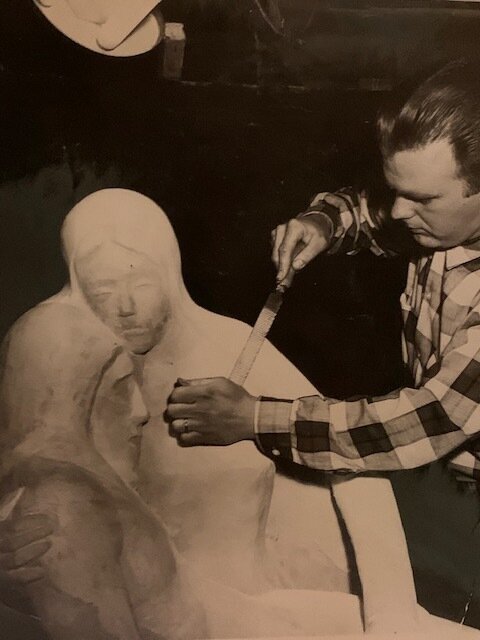
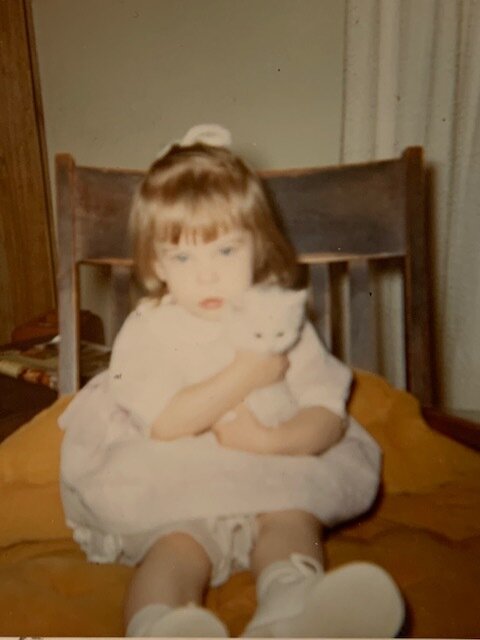
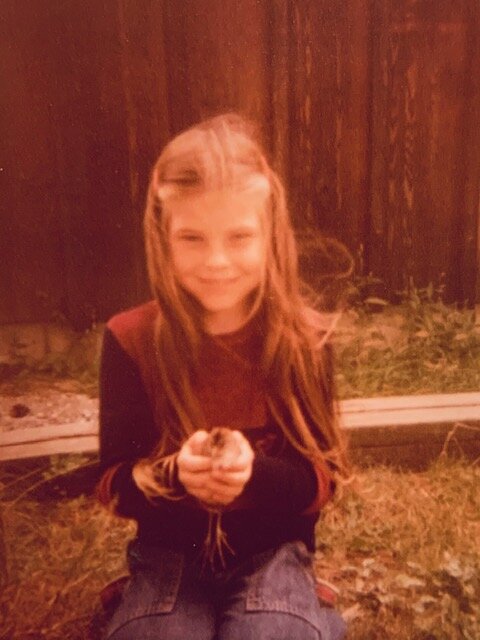
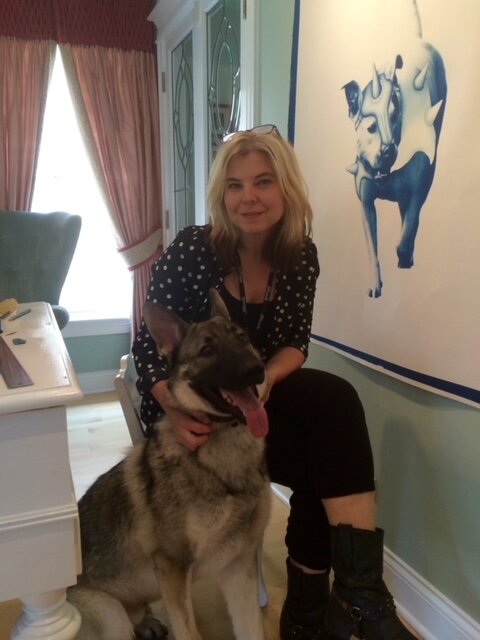
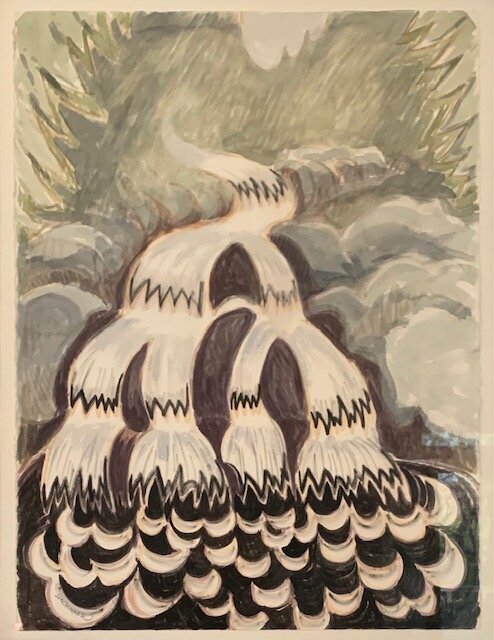
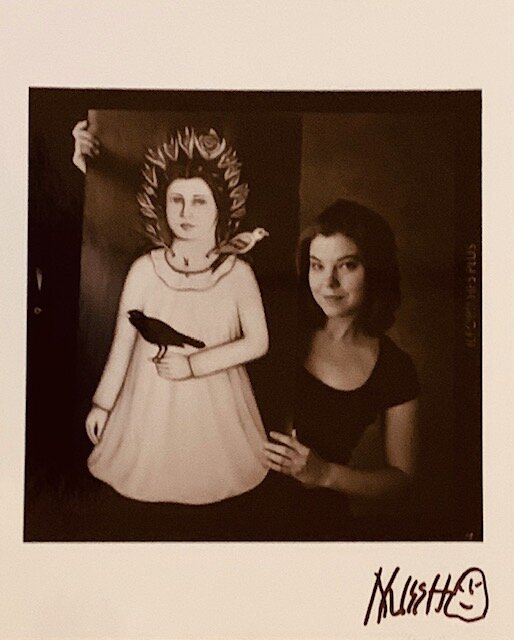
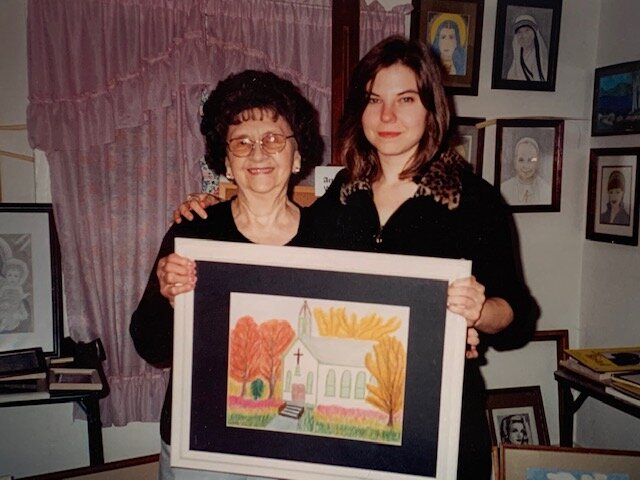
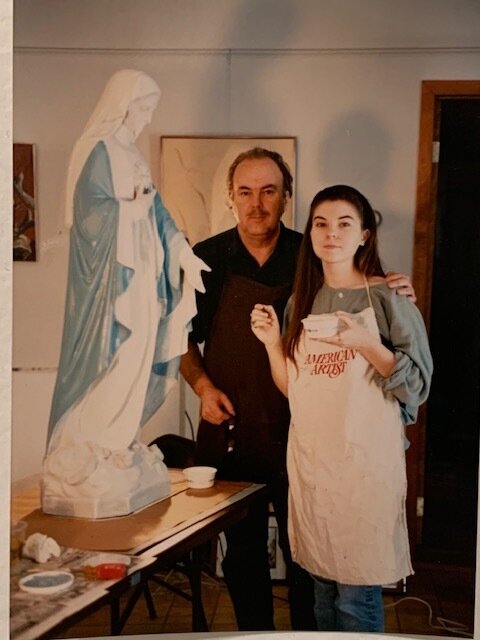
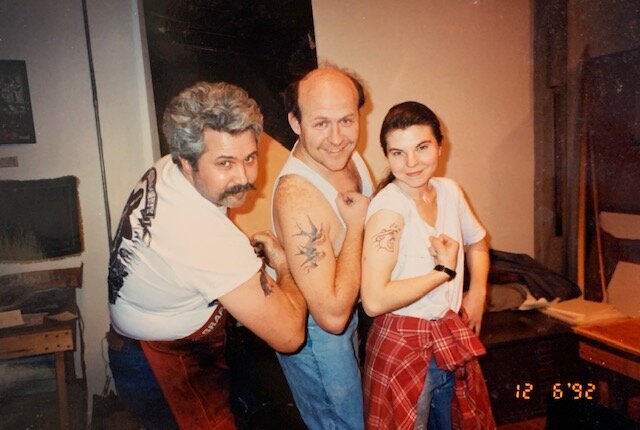

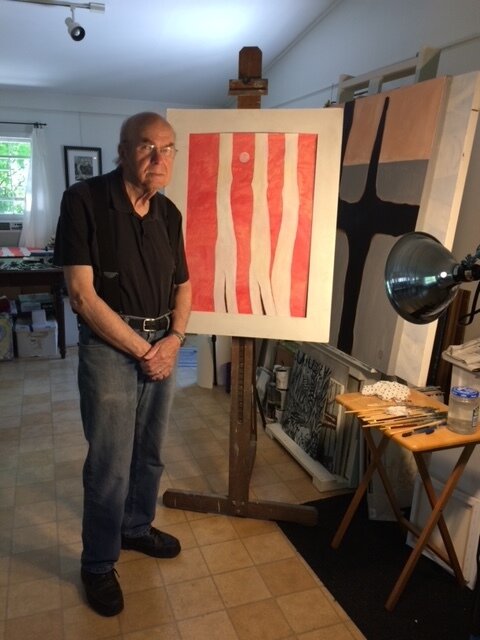


Connect with Ricky and the E2K Community
> INSTAGRAM: @eager_2_know
> FACEBOOK: Facebook.com/eager2know
Show Transcipt
Ricky McEachern (00:02):
Creating artwork can enable someone to express key parts of themselves, their personality, their past, or their values. So often when you were looking at artwork, you are seeing parts of the artist.
Ricky McEachern (00:50):
The story of today's guest starts in a small Michigan town on Lake Erie, Port Sanilac population 623. Teresa James grew up there with her three siblings, mom, and dad, and many, much loved pets. Over the years. It was a town where everyone knew everyone. And there were lots of families with the same name as theirs. When Theresa left Port Sanilac and ventured out into the world, she left with a strong faith, a love of animals and an inclination towards the visual arts. I came away from my conversation with Teresa, seeing someone who values kindness and how this has been core to her journey. I am pleased to share my discussion with artist, Teresa, James.
Ricky McEachern (01:43):
I know we spoke previously about this, a world that we can't see combined with a world that, you know, we exist in and see every day. And that's one of the ideas of the show. Can you tell me a bit about that idea of, I don't know if I'd call it spirituality, but this idea that there is something else that's going around us all the time that we can't hear and see, but that you know is here.
Teresa James (02:09):
Yeah. I think all of that comes from my Catholic faith and, um, my spirituality in that way, I was raised Catholic and I'm still a practicing Catholic today. Uh, and it's always a source of inspiration to me. And I've always felt like somehow aware or connected to talking about the afterlife and where we go after we're here. And I was always so, um, interested in it and it visually in my mind always, uh, gave me pictures of things that I wanted to create.
Ricky McEachern (02:50):
You had mentioned that your Catholic faith is a source of inspiration. Would you say that you grew up in a, like a strict Catholic home? I would
Teresa James (03:00):
Say that I grew up in a devout Catholic home, but my parents were such loving sweet people. They're, you know, my dad is an artist and my mom was really super creative and we always felt like we could go to our parents and talk about whatever. So I guess in a way you could say strict, but it wasn't like unkind and it wasn't overpowering me. Like I felt like I was being, you know, forced to do what they said. It wasn't like, no, you need to do this. Or, you know, this is gonna happen. And we always were able to talk about things. And we went to church every Sunday and we, you know, we practiced or we tried to practice our faith and they just always taught us as kids to, uh, you know, be kind to other people do your best in the world. They were always very supportive. And so it was a very loving home. They were always available. My dad worked so hard to support the family and my mom was always there taking care of us kids when we needed her. So they really did their job.
Ricky McEachern (04:10):
Now you grew up in a very small town in Michigan? Yes. I think you had said it was like 4,000 people
Teresa James (04:17):
Actually. Um, right now, I think it's between five and 600 people
Ricky McEachern (04:23):
Looking back on it. Do you feel like you were removed from culture a bit? You obviously had television and radio and all that, but you're not, you weren't close by to a big city. Right. But you felt like you were somewhat caught off at all?
Teresa James (04:41):
Yeah, to some degree. I think also we lived in a town port, San Lac, which is right on Lake Huron. And it would have been too it's two hours North of Detroit. We definitely didn't grow up knowing a lot of certain things that you might know about going to the city. But I think once I left port San Lac, I moved to California for awhile. And I just remember the story. I didn't really even know what sushi was. And then when I moved out there, I was like, what's sushi. And then my friends told me and I'm like, Oh my gosh, this is so cool. You know? So there are those little things like that where maybe I wasn't experienced in the world. And that's kind of why I got to a point where I knew I wanted to go and get out. I wanted to leave and, you know, explore art and just meet people and, and to kind of get outside and see what, what else is out there.
Ricky McEachern (05:45):
So was that something where I need to get the heck out of here? Or was it more of a, Hmm, I'm kind of curious to see what's out there. Yeah,
Teresa James (05:55):
I think it was like maybe sort of in between, because I enjoyed my life there and I had such great friends and I wanted to be a fashion designer. And so I knew I couldn't do it there. So it was kind of like, yeah, I can't wait to just get, get out and, you know, do what I need to do. Okay.
Ricky McEachern (06:15):
You had mentioned your dad was an artist, is that correct? Um, was he, can you tell me a little bit about him in terms of like where he grew up and what he did for art? Cause I'm curious about someone who lives in a, uh, a male who lives in a small town like that. Who's an artist that, how do you get to that?
Teresa James (06:37):
My dad was a young boy. His uncle was in the war and would send him little sketches of planes and things. And my dad really liked that. And so he kind of got him into drawing as a kid. And then as he grew up, he always kind of pursued that art on the side. So in port sand, like where I grew up, that's where my grandparents lived. That's where my dad grew up and my mom grew up. So everybody like knew each other. It was kind of like this cozy, quaint little town. And so my dad, as he got older, uh, he actually went to the center for creative studies. So he went to center, creative studies, he painted and drew, they kind of met, well, she was working in the TV shop in this little town. He would go stop in there. And he saw that she had some drawings laid out and then they got talking.
Teresa James (07:31):
And so then they kind of met and I think liked each other. And they ended up getting married. So while they were married, that's kind of when art school, he kind of quit going to art school after that, but he pursued his work. He still painted and, you know, would have art shows like just in the town or nearby, but he always continued to pursue that. I remember too, my mom telling me stories when they got married, uh, they were kind of like these art artsy people, the town, and they were kind of like known as the beatniks of the town because they were the black and we're kind of a little bit like different than everybody else. I always remember my dad making art. He always had a little studio and he, he worked really hard, like having his own businesses and stuff, but he always find, found time to make his own art. Like even if it was a long day and he was tired, he always had time for us kids when he came home and he always found a moment or two to like keep painting.
Ricky McEachern (08:37):
It's great. Now did, did your siblings, did any of them, um, pursue artistic avenues?
Teresa James (08:46):
My sister and all my other two brothers, everybody's all really in creative type jobs. My youngest brother, Matt. He is an artist too. He shows, uh, in Chicago and New York and he, he does drawing as well. And then my brother, Mike, he has his own techno band. It was called deep chord. And then he kind of went off into his own thing as Mike Schomer. So he's kind of known more like in Europe and Germany with his techno music. And then my sister was always really creative in so many different ways and she writes a lot. She's constantly writing and she's got great stories, but she also is, um, spending a lot of her time helping elderly and works with elderly people. But everybody's all really creative.
Ricky McEachern (09:39):
Yeah. I think that's a great story. What a gift that your parents gave you to essentially give you the license to be creative? Because I talk to people obviously all the time on my podcast, you know, everyone starts out as a kid being creative and there's art class, but then at some point it breaks off in some kids, a very small percentage of kids stick with that, but most, most kids do not. And they pursue something that either they're not going to get made fun of, you know, particularly with boys, you know, being an artsy boy, isn't always, you know, I was subject to a bit of ridicule, um, or something that's more guaranteed a career, you know, all the reasons. And it's wonderful that there was sort of this foundation. It sounds like that was very solid. That allowed you to see that as a value of, um, a valued way to pursue your life.
Teresa James (10:35):
I always remember my father and mother being, um, very positive where it's like, if you want to pursue this, then that's great. They never forced us, you know, to be in the arts or to go to college. Um, my dad told me that his father always told him that it didn't really matter what he did, but as long as he did it well and took pride in his work and did his very best and always treat others with kindness. Um, so that was kind of the base.
Ricky McEachern (11:12):
So family, faith, art, it sounds like these are foundations of you. Are there, is there anything else? Uh, that's a big part of you that we need to talk about.
Teresa James (11:23):
Those are the big ones, but I guess you could throw in like my animals, I've always been an animal lover and um, I have three.
Ricky McEachern (11:32):
Do you have a lot of pets as a kid?
Teresa James (11:34):
Well, you know, we had cats and then we also had a beagle named Jake and then he died and then we got Jack who was Jake's son. But when I was younger, um, Jake and Jack were a little too jumpy on me. So I was like, ah, so I had all my kitty cats and I had one cat in particular, Thomas Siena. She was a stray and I have home movies of me where I would just kind of lean over and she'd jump up on my back and we'd walk around with her and she'd just ride on my back. So I kind of had like little strike hats here and there. And then we of course had mama kitty. Um, and she was like the old, you know, veteran cat of our whole, you know, cat lives that we had. And then, but you know, it was kind of funny.
Teresa James (12:23):
I was always bringing home like a bird or a mouse or something that was like injured and I wanted to make it better. So, uh, Yolo, I have a lot of photos of me when I was younger with an animal in my bed and like just, you know, holding all of these different little animals that I'd find. And then I do remember my mom's saved this letter. I wrote to my parents and it was pleading with them that I wanted a fancy dog. And I just was like, please, please, all I want is a fancy dog. I'll do anything because you know, we had the beagles and I'm like, I just, I don't know what I thought a fancy dog was like a Collie or something, but so she saved the letter and I just was like, Oh, tears, I'm in tears, tears, tears, please let me have a fancy dog.
Ricky McEachern (13:15):
When a child is an animal lover, like you were like, what, what do you think that says about them as a person? Cause obviously the traits that we have as a child, a lot of them are just hardwired and they, you know, they either we keep them or they turn into something else as an adult, if a child is a animal lover, what do you think that, that means about them as a person?
Teresa James (13:41):
I think it means that maybe they're a compassionate, a little more compassionate person having more compassion in the world. I mean, not to say that, you know, if you don't love animals, you don't, but yeah, I think it's like, uh, something special because I feel like animals are so calming and they, you can learn so much just from being around an animal and just being in a relaxed state. They, you know, if you're a stressed out, I feel like you can talk to a dog and just, you know, it doesn't matter. You can just let them know what's on your mind. And they're always right there.
Ricky McEachern (14:26):
Well, I think it's wonderful that you have the ability to take all of these things that are meaningful to you, meaningful to you, uh, you know, animals, your faith, um, and you have this artistic way to express it. That's that's fantastic.
Teresa James (14:48):
Thank you. Yeah. I feel blessed because you know, it's sometimes hard for people to know, like, what am I supposed to do in this world? You know, what is my purpose? Because we all have a purpose. We all have our strengths and weaknesses and uh, it finding out what that is and what our mission in life is while we're here. And I think it really boils down to helping others in whatever you do, whether it be art or if you are working like in the medical field. And, you know, cause sometimes I think, well I want to do more for other people. How can I really help people is making art enough? And I feel like, yeah, it is what I'm meant to be doing. And of course I do want to help and I try to do other things outside of that as well. But a lot of people can feel lost and like, what is my purpose? What is this thing that I'm meant to do in life? And they can go from different jobs and trying out things. So I felt very fortunate that I kind of knew at a young age, even though fashion design was like the first love. It changed over time.
Ricky McEachern (16:03):
Do you believe that everybody has a purpose?
Teresa James (16:06):
Yeah, I do. I think we do. It's true. I don't know what it is for everybody, but it's our, we have to find out what that is. I feel like everybody's unique and everybody is a special person. And uh, you know, I don't like to think lump people all in one big group, like as just numbers, like when you encounter someone they are important and it doesn't matter if it's somebody who's maybe living on the streets or maybe it's somebody who's, you know, uh, rich, high powered, whoever, and maybe somebody that you don't really get along with or whatever, but everybody is important.
Ricky McEachern (16:54):
So if someone is listening to this and they haven't found their purpose, uh, do you have any suggestions, ideas, guidance for how they can get that answer?
Teresa James (17:08):
Yes. Well, I mean, for me, it's all about prayer meditation. If that, you know, prayer is meditation. So I guess for advice for in general, anybody, I would say just take some quiet time to like either pray, meditate or, or just maybe, um, just get out in nature, you know, that can help you think about things and then maybe write things down and list your qualities that you look as those good qualities that you might have because everybody has, you know, like I said, strengths and weaknesses. So what are your interests and what are your strengths? Because feel like, you know, while you're here, we need to be doing things to help each other. It's not about just kind of floating around and, you know, watching Netflix all day, you know, um, yeah, just finding purpose. And I always, I feel like when you are, uh, if you're lost, I feel like the best medicine for that is just go out and try to do something nice for someone, find a way where you can help somebody else out.
Teresa James (18:20):
And maybe that would like open a door, open your mind to something that you never thought you would do. I would say, don't get stuck in a plan now for me, I did become, you know, I'm continued making art, but like I said, I wanted to be a fashion designer and that was it. I was like, I'm going to do that and nothing's going to stop me. But I was open when I, you know, had this kind of realization. Like I don't think that's where I'm meant to be. And I was open to that and open to trying something new. You have to follow your heart and your dream of what you think that might be. And it could be something that you never thought. And a lot of times it is, you know, and the journey of life, you know, you could be doing something for years and years and years, and then, you know, things change and you thought, well, I never thought I would be here. So I th I think there is that you don't want to give up, but also knowing when maybe it's time to try a new, another way.
Ricky McEachern (19:31):
The thing that you mentioned was other people on the planet, having a dramatic impact on you and the direction of your life, your career, and you mentioned Tony Fitzpatrick. Um, can you tell me a little bit about that, that relationship and how, what that, how that impacted you?
Teresa James (19:53):
So I moved to Chicago and my plan was to go to the school of the art Institute of Chicago. I say, I see, so I'm enrolled in school. And at the same time, I, you know, I always had to, like, my parents could never afford to put me through college and that, so I always had to have jobs and pay for my school and get loans and they would help me as much as they could. So here I am in Chicago and desperate for work. And my friend was trying to get me in this coffee shop, where she was working. And I had to just kind of take whatever I could on the side while I was going to school until I could find something a little bit better. But so anyway, she gets me this job at the coffee shop, and it just so happens that Tony Fitzpatrick it's the coffee shop that he would go to every day.
Teresa James (20:43):
He is a Chicago based artist who, uh, is a printmaker. And he does these beautiful bird collages. He's known all over the world. Um, yeah. And he's also like a man of many talents. He's been on radio, he's an actor, he's a writer, a poet. Um, and so I was so fortunate enough to bump into Tony in my life. And here we are at the coffee shop and I just started going to art school and he, and I would get into conversations. And he had told me that he was opening up a print shop and he needed somebody to work for him. And I'm like, Oh, I would love to it just so turns out that I'm taking printmaking classes right now at SAC. So, uh, he's like, would you want to come work for me when I open up? And I'm like, yeah. So we stayed in touch, you know, cause he would come in daily and I kept asking him like, Hey, you know, when you're ready to get to, you know, hire me yet.
Teresa James (21:46):
And so it finally happened and that was about 1990, 91. And so I started working for Tony and I mean, what an education there, it was like, here I am working for this artist who can teach me so much when you're working with someone in a small business, you become kind of like a family too. And so I knew his family, his wife and kids and his parents and his siblings, all wonderful people. And Tony always included me like, would you get collectors to look at my work? He'd put me in shows. I, you know, with him. And it's like, he didn't have to do any of that, you know, but he was always so generous and I learned so much just watching him, um, you know, doing the business end of it. And uh, you know, so it was not only just his artwork, but it was just the whole package.
Teresa James (22:54):
And so I ended up working with him for 13 years. You know, I met my husband through Tony, so Tony's dad knew my husband's dad. And then my husband, bill, he is really into art and he was always wanting to collect art as a young person. And Tony Fitzpatrick was one of the first artists that he started collecting. And so, so the, uh, my husband's dad kind of made a connection so that bill, my husband could meet Tony and see his work. And so he started buying Tony's work and he ended up buying my husband, bought some of my work through the studio. So when my husband bill bought my work, when he wasn't one of my husband at the time, I was like, Oh great. And this guy, you know, he paid me and he, you know, this is awesome. And then we joke later that after I got married that I got the sale and then I got the guy and then I got the work back. So,
Ricky McEachern (23:58):
So Teresa, thank you so much for talking with me today. Um, I did see one of your animals made an appearance in the back while you were talking, uh, you want to, your, it looked like it was a German shepherd.
Teresa James (24:09):
Oh, okay. My Shiloh Shepard, and then I have a giant Newfoundland somewhere and then I have a little, it'd be baby.
Ricky McEachern (24:19):
Well, thanks for talking to me. Um, where can people go to learn more about your you and your artwork?
Teresa James (24:28):
Well, I show at Hofheimer gallery in Chicago, so you could go to their website and, um, I have a website, Teresa James, art.com and uh, anybody could call the studio and talk to me. I'm really easy to talk to and approachable. And if anybody I know right now with COVID, uh, but you know, people are always welcome to come by my studio and look around and I'd be happy to talk to anybody. Um, I love sharing what I do. So, um, yeah.
Ricky McEachern (25:01):
Okay, great. Well, thanks again for talking to me. Introduction music was breaking over branches by fog Lake.



